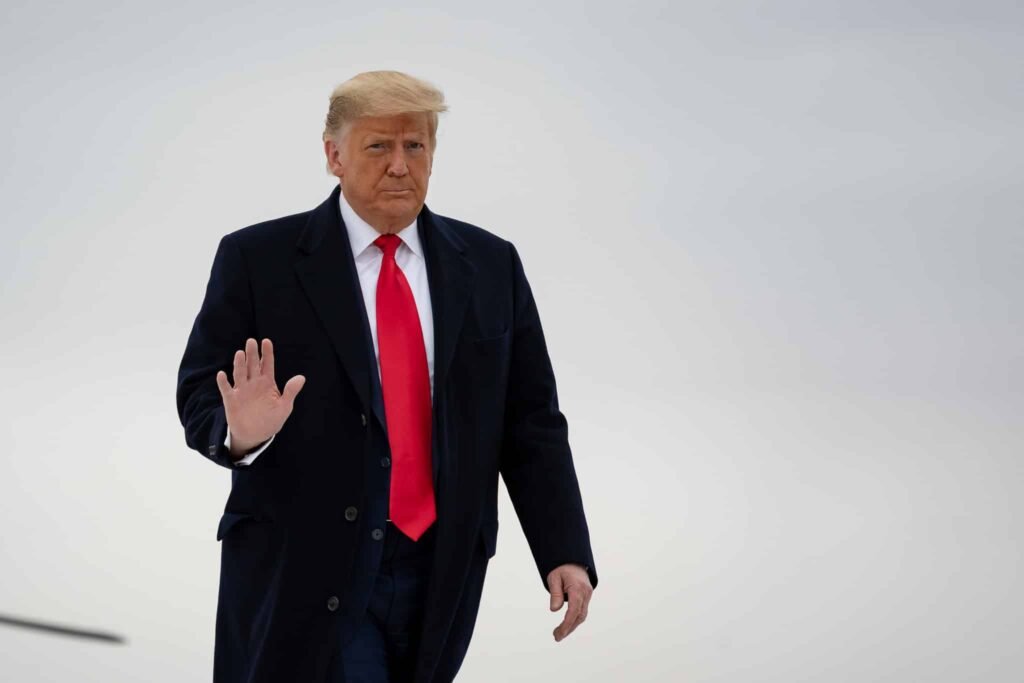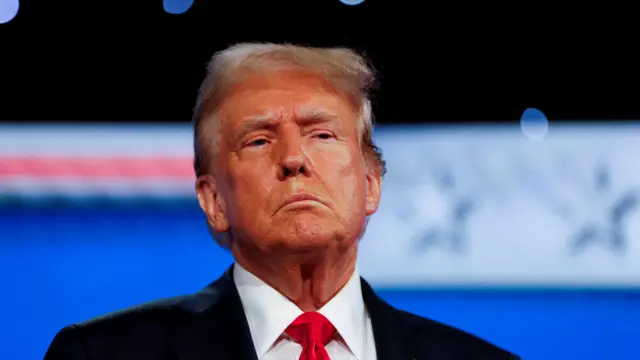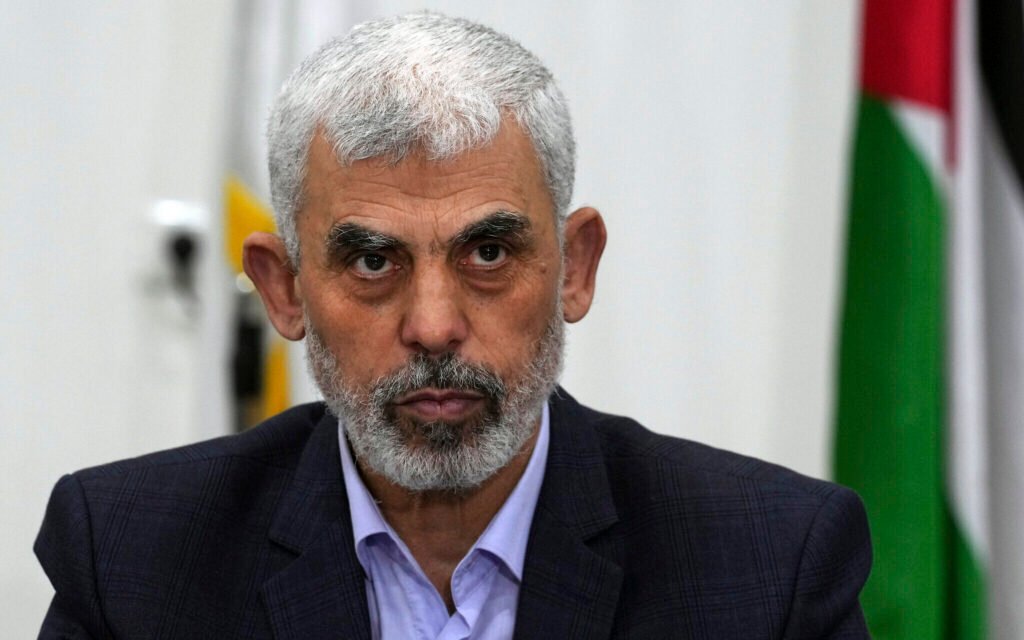Introduction
Donald Trump’s has responded to the recent death of Yahya Sinwar, the leader of Hamas, which has stirred significant reactions across the political landscape, particularly in the context of U.S. foreign policy and the ongoing Israeli-Palestinian conflict. Sinwar, having held a pivotal position in the militant organization, was influential in shaping Hamas’s strategies and its confrontations with Israel. His leadership has been characterized by a steadfast commitment to resistance against Israeli control and a strong opposition to peace negotiations that could lead to a two-state solution. The implications of his passing extend beyond Hamas, affecting regional stability and the dynamics of international diplomacy related to the conflict.
Donald Trump, the former President of the United States, has been vocal regarding his thoughts on Middle Eastern issues, often emphasizing a hardline stance towards groups like Hamas. His reaction to Sinwar’s death is expected to influence public perception and could potentially reverberate through the Republican party’s approach to foreign policy, especially as it pertains to the Israeli-Palestinian conflict. This moment presents a critical juncture for examining how the Trump administration previously handled relations with Hamas and whether current sentiments align with his past declarations.
This blog post aims to explore Trump’s response to the death of Yahya Sinwar, analyzing the former president’s statements, the broader implications for U.S. foreign policy, and the potential impact on future negotiations in the region. Understanding Trump’s perspective is essential not only for assessing the immediate aftermath of Sinwar’s death but also for anticipating how this event might influence future interactions between Hamas and the United States. By examining these elements, we gain insight into the shifting dynamics of a long-standing conflict and the role that leadership changes play in international relations.

Trump’s Initial Reaction
Following the announcement of Yahya Sinwar’s death, former President Donald Trump wasted no time in publicly expressing his views. In a statement shared on social media, he described Sinwar as a figure who was “not a good person.” This characterization reflects Donald Trump’s longstanding perspective on Hamas and its leadership. Sinwar, who held a prominent position within Hamas, was known for endorsing violent resistance against Israel and had a notorious reputation for his uncompromising stance on terrorism.
Trump’s remarks were not merely personal opinions but were indicative of a broader political narrative he has consistently supported. By labeling Sinwar negatively, Donald Trump aligned himself with those who view Hamas as a terrorist organization that threatens the stability of the region. This perspective is particularly relevant as Trump emphasized his approval of Israeli Prime Minister Benjamin Netanyahu’s military actions leading to Sinwar’s demise. Donald Trump stated that he was “happy” about these actions, showcasing his alignment with Israel’s aggressive stance against its adversaries.
Moreover, Donald Trump’s response underscores his administration’s approach toward foreign policy, particularly in relation to terrorism. Under his leadership, the Trump administration adopted a tough stance against groups like Hamas, advocating for stringent measures and military support for allies such as Israel. This reaction illustrates a continuity in Trump’s ideological framework concerning the Middle East, where he views the elimination of figures like Sinwar as essential for combating terrorism.
In light of these events, Trump’s initial reaction to Yahya Sinwar’s death serves as a reflection of his broader views on Hamas and the ongoing conflict in the region. His categorization of Sinwar as a negative entity, coupled with support for Israeli actions, emphasizes his commitment to counter-terrorism efforts and provides insight into his political philosophy regarding peace and security in the Middle East.
Impact on Peace Efforts
Following the death of Hamas leader Yahya Sinwar, former President Donald Trump expressed the view that this development could positively influence peace efforts in the Middle East. Trump’s assertion that “it makes everything easier” reflects his belief that the removal of key terror figures may pave the way for advancements in diplomatic negotiations. During his presidency, Trump sought to facilitate agreements between Israel and various Arab nations, aiming to create a more stable and cooperative regional environment.
The Israeli-Palestinian conflict has long been marked by deep-seated tensions, and the actions of militant leaders often serve to impede peace negotiations. Trump’s perspective echoes a broader sentiment that eliminating influential leaders of groups like Hamas could disrupt their command structures and reduce violence, subsequently fostering an atmosphere conducive to dialogue. The former president’s historical approach to the Israeli-Palestinian issue hinged upon direct negotiations and addressing the security concerns of Israel, which he characterized as essential for achieving lasting peace.
Nevertheless, it is important to recognize the complexity of the landscape surrounding this conflict. While some may view the death of Sinwar as a potential stepping stone for peace, others argue that such actions might escalate tensions further, leading to retaliatory attacks and regional instability. Critics contend that impulsive reactions to leadership changes can overlook the nuanced realities on the ground and the ongoing challenges posed by militant organizations. Thus, while Donald Trump’s statements suggest an optimistic outlook regarding peace efforts, the potential for a multifaceted reaction from the Palestinian factions cannot be understated.
Communication with Netanyahu
Following the death of Hamas leader Yahya Sinwar, former President Donald Trump disclosed that Israeli Prime Minister Benjamin Netanyahu reached out to him for a conversation. This communication underscores the ongoing, intricate relationship between the United States and Israel, highlighting the significance of mutual support in addressing regional challenges. Israel has long viewed the U.S. as a key ally, particularly in its conflict with Hamas and other groups posing threats to its national security. The timing of Netanyahu’s call to Trump indicates both leaders’ recognition of the need for collaboration in navigating the evolving geopolitical landscape.
The discussion likely encompassed not only the implications of Sinwar’s demise on Hamas’s operational capabilities but also broader concerns regarding stability in the region. Trump’s openness to these dialogues suggests a possible shift in the U.S.’s diplomatic strategies concerning Israel-Palestine relations. The former president’s direct engagement with Netanyahu may foreshadow a recommitment to traditional U.S. support for Israel, which has been a hallmark of American foreign policy.
Moreover, this communication could signify an impending shift in how the U.S. perceives and addresses threats posed by militant groups in the region. The former president’s intention to continue this dialogue with Netanyahu may facilitate a more coordinated approach to security strategy, further solidifying U.S.-Israel relations. As Donald Trump prepares to engage with Israeli leadership, the outcomes of these discussions could lead to renewed efforts aimed at promoting stability, which is essential not only for Israel but for U.S. interests in the Middle East as well. Ultimately, recognizing and valuing these dialogues might play a pivotal role in shaping the future of Israel’s defense policy and its collaborations with the United States.
Critique of Biden’s Approach
Former President Donald Trump has been vocal in his critiques of President Joe Biden’s approach toward Israeli Prime Minister Benjamin Netanyahu and Israel’s handling of Hamas in the wake of the recent killing of Hamas leader Yahya Sinwar. Trump asserts that Biden is attempting to ‘rein in’ Netanyahu, suggesting that the current administration is taking a more restrained stance on Israel’s response to threats emanating from Hamas. This perspective contrasts sharply with Trump’s own foreign policy approach during his presidency, which prioritized strong support for Israel without imposing constraints on its military actions (Council on Foreign Relations).
Trump alleges that Biden’s policies could hinder Israel’s ability to effectively combat terrorist threats and protect its national security. Donald Trump implies that Biden’s administration lacks the fortitude required to support Israel unequivocally, and as a result, this may embolden adversaries like Hamas. By contrasting his firm stance on Israel with what he perceives as Biden’s appeasement strategies, Trump aims to present himself as a more reliable ally to the Israeli government.
Moreover, Donald Trump has suggested actionable strategies for Netanyahu, urging a more aggressive military response against Hamas to eliminate potential threats decisively. He believes that a strong stance is imperative for Israel, particularly in light of Hamas’s ongoing hostility. The differences in approach between the two administrations reflect broader ideological divides in their foreign policy strategies. While Donald Trump promoted an assertive pro-Israel narrative, Biden’s approach tends to emphasize diplomacy and caution, which Trump claims could undermine Israel’s strategic advantage (Washington Institute).
In summary, the ongoing dialogue surrounding U.S.-Israel relations is shaped by the differing philosophies of the two administrations. Trump’s critiques of Biden’s foreign policy indicate a clear ideological schism, particularly regarding Israel’s defense posture and the handling of threats from groups like Hamas.
Background on Yahya Sinwar
Yahya Sinwar was born on 26th October 1962 in Khan Younis, a city located in the southern Gaza Strip. He grew up in a predominantly Palestinian environment, which significantly shaped his political and ideological views. Sinwar’s early life was marked by the socio-political upheavals that affected the Palestinian territories, particularly the Israeli-Palestinian conflict. His involvement with Hamas, an organization founded in 1987 during the first Intifada, began when he was a teenager, as he sought a path that aligned with his nationalist inclinations and aspirations for Palestinian liberation.
Sinwar’s rise within the ranks of Hamas has been notable. He was initially imprisoned by Israel for a significant period, from 1988 to 1997, during which he became increasingly radicalized. Upon his release, he took a leadership role in the organization, particularly in building and strategizing for its military wing, the Izz ad-Din al-Qassam Brigades. His efforts in military operations solidified his reputation within Hamas, and he soon became known for his strategic acumen and operational effectiveness.
In 2012, Sinwar was elected as the head of Hamas in Gaza, a position that allowed him to exert considerable influence over the organization’s policies and actions. His leadership was characterized by an increased focus on military strength and resilience against Israeli operations. Additionally, under his command, Hamas has faced significant challenges on various fronts, which have led to his designation as a global terrorist by multiple nations, including the United States and the European Union. These designations reflect the broader international concerns surrounding his activities and the implications of his leadership for peace in the region. Sinwar’s role in Hamas thus remains central to understanding both the internal dynamics of the organization and its external relations.
Sinwar’s Role in Hamas
Yahya Sinwar emerged as a pivotal figure within Hamas, serving as a testament to the organization’s complex interplay of military prowess and political strategy. As a co-founder of the Izz ad-Din al-Qassam Brigades, Hamas’s military wing, Sinwar’s contributions were integral to shaping the group’s operational strategies and tactical decisions. His leadership style emphasized a blend of armed resistance and governance, positioning him as an essential architect of Hamas’s sophisticated military operations against Israeli forces over the years. Sinwar’s strategies included not only direct confrontations but also innovative tactics that aimed to extend the group’s military reach while mitigating casualties on their side. This approach reinforced Hamas’s status as a formidable entity in the region.
On the political spectrum, Yahya Sinwar’s influence extended well beyond military tactics. He played a crucial role in the organization’s political negotiations, especially during critical periods of conflict. By engaging with various political factions and regional powers, Sinwar spearheaded discussions that sought to establish a more unified Palestinian front. His established ties with key regional Arab powers facilitated dialogue with neighboring countries, which was essential for garnering support and resources for Hamas’s operations. These relationships bolstered the organization’s legitimacy within the broader Arab political context, solidifying its standing among other factions.
Sinwar’s impact within Hamas is marked by his dual role as both a military leader and a political figure. His strategies not only influenced the internal dynamics of Hamas but also its broader engagement with regional geopolitics. His ability to navigate the delicate balance between warfare and diplomacy has been pivotal in shaping the organization’s direction and has, in many ways, defined the contours of Palestinian resistance. Through Sinwar, Hamas has sustained a nuanced approach that continues to resonate within the complexities of Middle Eastern politics.
Global Reactions to Sinwar’s Death
The death of Hamas leader Yahya Sinwar has incited a diverse array of responses on a global scale, reflecting the multifaceted nature of geopolitical dynamics in the region. Political figures from various nations have expressed their stances regarding the implications of this event on peace prospects and security in the Middle East. In Israel, Sinwar’s demise was largely hailed as a significant victory against terrorism, with officials asserting that it could potentially lead to a decrease in hostilities from Hamas. This sentiment is mirrored by several Western leaders who view the death as an opportunity for strengthening regional stability.
However, reactions from other quarters have been markedly different. In parts of the Arab world, prominent individuals have condemned the act as an escalation in violence, arguing that such measures could deepen the cycle of retribution and conflict rather than pave the way for peace. Analysts in the region have noted that while Sinwar’s leadership was often associated with militant strategies, his death could create a power vacuum that might foster instability within Hamas, as factions vie for control in the absence of a strong figurehead.
Civil society responds similarly, with grassroots opinions ranging from relief to concern. Some citizens perceive a potential for peace following Sinwar’s removal, while others are apprehensive, fearing retaliatory actions from Hamas may occur in response. This variance underscores the complex reality on the ground and illustrates how the implications of such significant events are interpreted differently across cultural and political contexts. The global community remains fixated on how this pivotal moment will shape not just the fate of Hamas but also the broader landscape of Middle Eastern politics.
Conclusion
In reflecting upon Donald Trump’s response to the death of Hamas leader Yahya Sinwar, it is essential to consider both the immediate implications and the broader context in which this event occurs. Trump’s comments, characterized by a mix of triumph and caution, underscore a divisive yet pivotal moment within U.S. politics regarding its stance on the Israeli-Palestinian conflict. The elimination of such a controversial figure brings forth discussions surrounding regional stability and the complexities inherent in peace efforts.
The implications of Sinwar’s death extend beyond the immediate reactions seen in U.S. political circles; they also pose significant questions regarding future peace initiatives in the Middle East. As Hamas remains a key player in the ongoing conflict, the vacuum left by Sinwar’s absence could contribute to internal power struggles, potentially impacting the organization’s strategy and its relationship with other Palestinian factions. This situation could lead to both new challenges and opportunities for diplomatic engagement, depending on how both local and international actors respond.
Moreover, Trump’s remarks also highlight the ongoing complexities of U.S. involvement in the Israeli-Palestinian conflict. The U.S. has a longstanding relationship with Israel, and shifts in Israeli and Palestinian leadership can significantly alter the landscape of diplomatic relationships. An analysis of potential future U.S.-Israel relations, particularly in light of changing regional dynamics, could reveal critical insights into how America may navigate its role as a mediator in this enduring conflict.
Overall, this moment serves as a crucial touchpoint for further analysis. It opens the door to exploring how U.S. foreign policy will adapt in response to evolving challenges in the Middle East, while also examining the implications for broader international diplomacy concerning Israel and Palestine.

